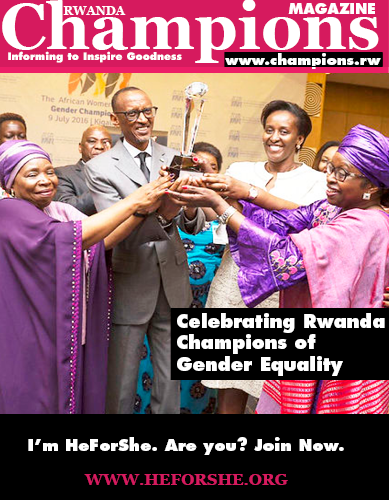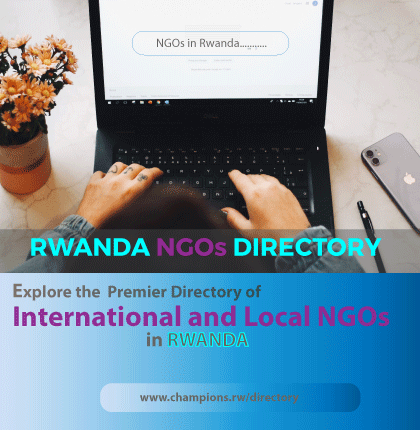African Women Leaders Urge Unity to Bridge Gender Gap in Leadership
African women leaders are calling for greater solidarity and collaboration to help more women attain leadership (…)

By YWCA Rwanda
When we talk about women empowerment, we talk about family development, we talk about national development and we talk about giving both women and men equal opportunities to develop not only at a personal level but also contribute to national development. Equally, we also talk about the need to stop gender stereotypes and practices that discourage women empowerment whether are anchored on culture, policies and laws.
Despite the fact that in Rwanda, women empowerment and gender equality have taken firm standing, there is still room for further improvement in order to uproot some of the remaining gender stereotypes and practices directed at women and girls that have been deeply embedded in our culture and taken by society as a reality. To achieve total women empowerment, there is always the need for the right laws and policies and the right environment to implement them.
Young Women’s Christian Association of Rwanda (YWCA Rwanda) is one of the local Non-Governmental Organizations (NGOs) that have joined hands with international NGOs and the government to actively support women and girls’ empowerment programs in Rwanda. And we are seeing great and encouraging results, something that encourages us to do more.


YWCA Rwanda believes that women empowerment should start in schools where gender equity and equality should be taught both girls and boys at a young age. This gives room and opportunity for the children to practice the best practices in order to grow up knowing what is good for the society and what should not be allowed in the society.
YWCA Rwanda and Plan International Rwanda have already taken the lead to ensure that the girl child is empowered at a young age. In our joint project, we have developed an approach that develops a Girl Safe Schools model that is holistic in nature and builds on girls’ personal, social and material assets in order to mitigate barriers to accessing quality education for girls such as Gender Based Violence (GBV) in schools, school environments that are not girl friendly and teaching and learning that is not student/girl child centered. This approach is destined to make school environment gender sensitive and friendly. To apply this approach, we use a package of teachings and practices through leadership and savings clubs in schools.
Through leadership clubs, we teach students, both boys and girls leadership skills, sensitize them on GBV, its prevention and response, gender equality and equity, and we educate them on sexual and reproductive health and rights (SRHR) and their consequences on the victim. Most importantly, we also engage young men to act and support empowerment of girls.
Some of the students who participated in the program. Photo by YWCA Rwanda.
Through savings clubs, we deliver financial education and skills; educate students on saving culture, resource management and forming financial enterprises. Students don’t only learn theories but they are also provided with learning and saving materials. With the savings clubs, our objective is to instill a culture of saving into students both girls and boys and to show them that they are both capable irrespective of their gender. This also helps in alleviating poverty that is the major contributor of inequality among boys and girls when parents are choosing who should be sent to school. Our approach also addresses special needs for adolescent girls by providing them with hygiene kits that help them during menstruation periods thus reducing class absences.
Having noticed that financial constraints are a great obstacle to women empowerment, this approach also provides livestock to students from poor families, which helps in improving financial statuses of families as well as strengthens social relationships in communities by passing the offspring of the livestock to their neighbors.
This approach is being implemented in secondary schools in Bugesera and Nyaruguru Districts, through three projects, namely Gender Responsive Schools and Supporting Gils’ Future in Bugesera and Girls’ Safe Schools in Nyaruguru District.
The experience from these projects have proven the approach to be effective and yielded positive results towards gender equality and girls and women empowerment both socially and economically. Young boys have shown exceptional understanding and actively support the cause. The impact is not only felt in schools of intervention but it also spreads to surrounding communities. Parents have changed mindsets towards women empowerment and boys and men have pledged their full support. This is a true HeForShe practice.
This experience informs us that, if we are striving for a durable and long-term change and if we want to fully achieve women empowerment and gender equity and equality, we must start with the adults of tomorrow. We must recognize our young boys and girls as the main agents of the change we want to see.
African women leaders are calling for greater solidarity and collaboration to help more women attain leadership (…)
Women for Women International (WfWI) has appointed Nigerian development expert Thelma Ekiyor as its new global chief (…)
Minister of Gender and Family Promotion, Consolée Uwimana, told rural women Wednesday that living in the countryside (…)
Rwanda’s First Lady, Jeannette Kagame, has been honored with the FIGO Distinguished Recognition Award in Women’s (…)

